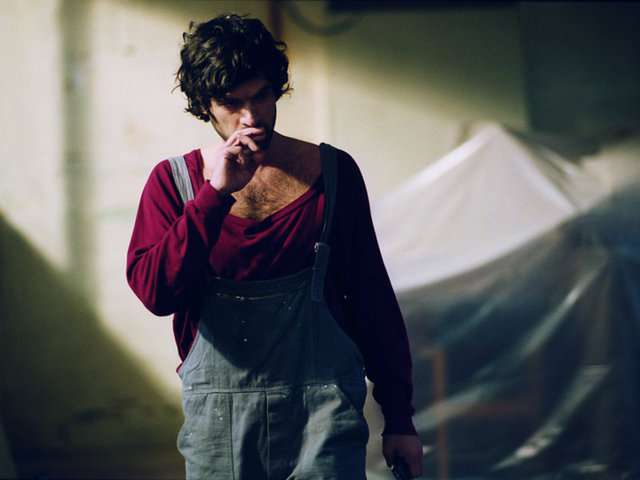 ROMAIN DURIS IN PERSECUTION. ANGST AT THE WORK SITE. BUT OVER WHAT?
ROMAIN DURIS IN PERSECUTION. ANGST AT THE WORK SITE. BUT OVER WHAT?(From the
Film Comment Selects series.)
Talking and agonizingPatraice Chéreau's disappointing new melodrama could be called Three Characters in Search of a Neurosis. Or perhaps the love-sick stalker played by Jean-Hugues Anglade has found his. Actually, though we don't know why, he's nuts; his character's name in the credits is simply "Le Fou," the crazy person. In a way Sonia's (Charlotte Gainsbourg's) character has found hers too: her neurosis is simply the protagonist, Daniel (Romain Duris). Trying to put up with Daniel's moods and pretending their relationship with such a self-absorbed drama queen has a future could be causing her to implode.
But what about Daniel? Daniel is a young man whose dramas have no discernible external motivation. He's disheveled in a fashionable, good-looking sort of way. He wanders between two construction sites, large rehab spaces actually, providing a spacious Parisian background for his rants, as well as a cool, if provisional, pad. As Daniel, Romain Duris does a lot of brow-wrinkling and complaining, as he does with more success in
Dans Paris and
The Beat My Heart Skipped, two other dramatic milestones for this actor that provided more of an objective correlative for his torments. But exactly what's bugging his character this time is not cleared up by the screenplay penned by Chéreau in collaboration with Anne-Louise Trividic, whom he worked with more successfully for his three previous films,
Intimacy (2001),
Son Frère (203), and
Gabrielle (2005). All we know is that Daniel and Sonia are both emotionally drained and insecure.
The feel of the action is appropriately operatic (and its images handsomely chiaroscuro) for a director who's successfully staged so many actual operas, but these arias aren't worth listening to. Unfortunately
Persecution illustrates too well the assertion of a friend of mine that French films consist of nothing but people talking. They talk about their relationship, they meet and part, meet again and talk some more, and they go to cafés and talk. There are some well-known actors in the café, with minor roles, including Gilles Cohen, Alex Descas, and Hiam Abbass. Some never get to say anything -- because the principals do so much talking, they're not needed, it would seem. Nothing much is happening except that Daniel feels he's not up to maintaining his relationship with Sonia. This is in spite of the fact that Sonia's work (whose nature is never specified) requires her to be frequently out of the country, and when she's back, they mostly just talk. This difficulty is compounded when "Le Fou" starts showing up with increasing frequency, doggedly pursuing (or persecuting?) Daniel and declaring his (mad) love, which nothing, even being beaten up by Daniel, can stop, and which nothing explains.
When Sonia's in town, Daniel is at her place two or three times a week, but always with the recriminations and suspicion on his part. And the narcissism, which is the less appealing since he appears to have no talent or consuming project to justify self-absorption. Eventually Sonia also begins to acknowledge that her relationship with Daniel is doomed. So you could also call this film The End of an Affair, or The Decline of a Relationship. Granted those titles are taken, or dull;
Persecution piques the curiosity more, even if it's somewhat inaccurate, unless you conclude that the Crazy Person played by Anglade is "persecuting" Daniel by constantly turning up wherever he goes, even invading his temporary living space. But the Crazy Person seems more like a device than a person.
There is an irony about this emotionally unconvincing device of Le Fou, because Anglade's first lead role in a feature film was as the youth in Chéreau's haunting 1983 drama of sexual obsession,
The Wounded Man/L'homme blessé. In
L'homme blessé Anglade's character is a teenage boy still living with his parents who, impulsively running out to a nearby train station one night, for the first time acts upon powerful homosexual desires that lead him to pursue a dangerous older man. Here, he's the older man, but still doing the pursuing. Only this time the film doesn't get inside his psyche, and his obsession seems more like an annoyance (for its object) than a troubling and irresistible impulse.
Leslie Felperin points out in his
Variety review of this film that
Persection's theme mimics that of Ian McEwan's novel,
Enduring Love, also made into a movie, of a man whose strained relationship with a woman becomes even more tormenting when he starts being stalked by a mad would-be male lover. The circumstances of meeting of the two men are shifted from a balloon accident to a meeting in a Metro station. However the Chéreau-Trividic writing team lack McEwan's knack for snappy plotting and
Persecution never seems like it's going anywhere, and never really does.
Nothing can take away from the intensity of
The Wounded Man, the dark beauty of
La reine Margot, or the emotion of
Those Who Love Me Can Take the Train or
Son frère; and even if its audience has been limited,
Gabrielle is a magnificent film. But despite some good moments and dedicated efforts from the actors, Chéreau is running on empty here. Maybe the gifted and charismatic Anglade, Duris, and Gainsbourg are exhausted too; maybe they should take a break from neurosis and go back to comedy for a bit.
Persécution opened December 9, 2009 in Paris with generally good, but some doubting, reviews (Allociné average score 2.0, points 51). Shown at the Walter Reade Theater, Lincoln Center, as part of the FSLC
Film Comment Selects series in February 2010. You'll get more detail, and more sympathy, in Mike Goodridge's review in
Screen Daily.





